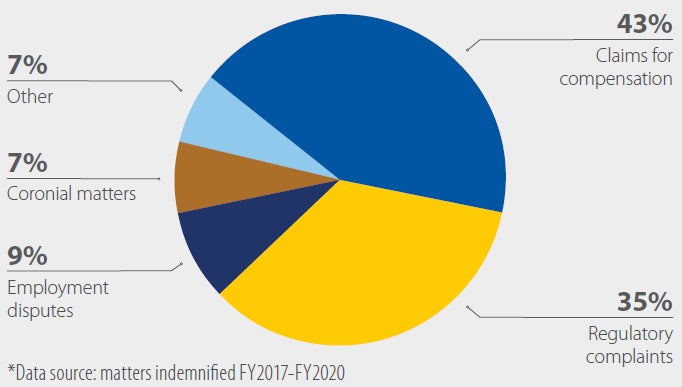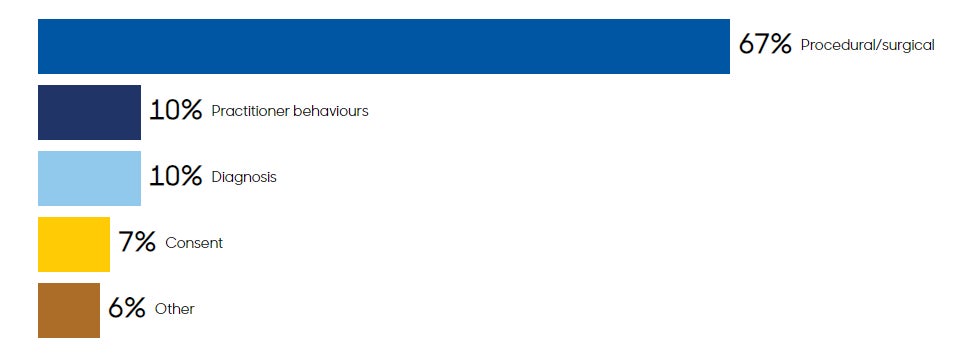
Claims and complaints insights: Neurosurgeons
Summary: What are the main issues driving neurosurgeon members' compensation claims and complaints? Find out the underlying themes and insights to reduce your risk of these types of claims and complaints, in our analysis.
Monday, 1 March 2021

One in three neurosurgeons had a matter in FY20
One in three Avant neurosurgeon members had a matter involving the provision of their care in FY20. Matters were primarily compensation claims and regulatory (e.g. Ahpra) complaints.
Doctors sometimes have allegations made against them even though they provided appropriate care. The types of matters Avant assists neurosurgeons with include*:

Our data analysis
The following retrospective review is of routinely collected and coded data and is based on 125 matters involving Avant neurosurgeon members across Australia. This analysis includes neurosurgeons only. All matters were closed over the four-year period from July 2016 to June 2020.
Common claims and complaints
The majority of medico-legal matters were compensation claims and regulatory complaints. These related to:

Types of procedures (procedural/surgical)
The majority of issues arose with spinal surgeries (82%), with cranial surgeries comprising a minority (14%). The most common types of procedures where allegations were made were:
- spinal fusion (e.g. anterior, posterolateral, posterior)
- discectomy
- decompression of lumbar spinal canal
- decompression of cervical spinal cord
- decompression of thoracic and thoracolumbar spinal cord
Stage of care (procedural/surgical)
The stage of care during which procedural/surgical issues occurred:

Communication and consent
While 67% of matters were based on allegations of procedural/ surgical issues, some of these contained more than one allegation:
- One in five cases had an additional allegation(s) of poor communication (e.g. failure to communicate results/information to patient, patient or family felt uninformed/condition not explained adequately)
- One in three cases had an additional allegation(s) of poor consent (e.g. inadequate discussion of risks).
10% of claims and complaints also had practitioner behavioural issues as the main allegation. These included allegations of poor communication, attitude or manner with patients.
Are doctors meeting standards?
When a medico-legal evaluation of expected standards of care was conducted, the doctor was considered to have met the standard in more than half of cases.

Key points
- Claims and complaints against neurosurgeons are common.
- Over half of matters were resolved positively for the doctor.
- Procedural/surgical issues were the main type of allegation, although communication and consent issues also gave rise to cases.
- Allegations about spinal surgery were more common than cranial surgery.
Resources
If you receive a claim or complaint contact us on 1800 128 268 for expert medico-legal advice on how to respond – available 24/7 in emergencies.
For more information on communicating with patients and a wide range of other topics, visit the Avant Learning Centre where you will find articles, factsheets, case studies, podcasts and many other resources.
Glossary
- Claims refers to claims for money, compensation and civil litigation claims.
- Complaints relates to formal complaints to regulators.
- Matters include: claims, complaints, coronial cases and other matters such as employment disputes and Medicare.
- Employment disputes are matters where Avant defends members against complaints or supports members to resolve employment issues.
For any queries please contact us at research@avant.org.au
Disclaimers
IMPORTANT: Avant routinely codes information collected in the course of assisting member doctors in medico-legal matters into a standardised, deidentified dataset. This retrospective analysis was conducted using this dataset. The findings represent the experience of these doctors in the period of time specified, which may not reflect the experience of all doctors in Australia. This publication is not comprehensive and does not constitute legal or medical advice. You should seek legal or other professional advice before relying on any content, and practise proper clinical decision-making with regard to the individual circumstances. Persons implementing any recommendations contained in this publication must exercise their own independent skill or judgement or seek appropriate professional advice relevant to their own particular practice. Compliance with any recommendations will not in any way guarantee discharge of the duty of care owed to patients and others coming into contact with the health professional or practice. Avant is not responsible to you or anyone else for any loss suffered in connection with the use of this information. Information is only current at the date initially published (January 2021).